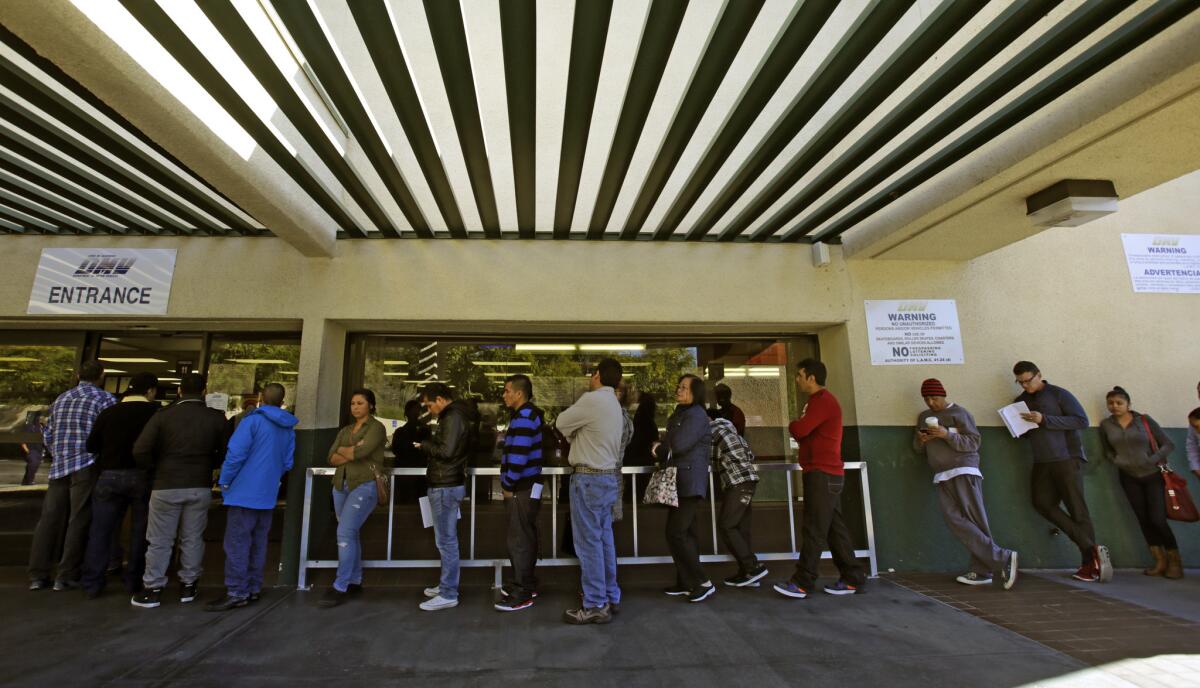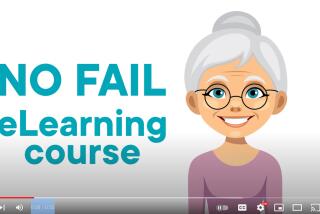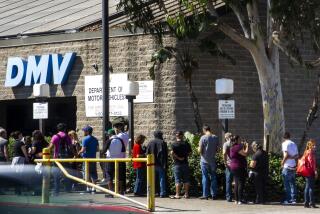California DMV closing all field offices to public to stem spread of coronavirus, memo says

SACRAMENTO — Faced with concerns among workers about the spread of COVID-19, the California Department of Motor Vehicles announced in a memo to employees Thursday that it is closing all of its more than 170 field offices to the public starting Friday.
In the memo obtained by The Times that was sent to employees on Thursday, DMV Field Operations Deputy Director Coleen Solomon wrote that the closures are part of the agency “taking steps to address employee health and safety concerns, including public contact and increasing social distancing between individuals.”
Employees will be placed on paid administrative time off as the offices are closed for cleaning and disinfecting from March 27 to 31, and staff will return to work April 1 though the offices will remain closed to the public.
When employees return to work on April 1, they will receive training to process online transactions, the memo said.
“The DMV is concerned about the health and safety of its customers, including seniors and those at risk for COVID-19,” the agency said in a statement. The agency did not provide a date when field offices would reopen to the public, but said it plans to expand online services in the meantime.
The DMV had previously scaled back operations but employees remained concerned about coming into close contact with customers who might carry the coronavirus.
A DMV employee in the San Joaquin Valley, who spoke on condition of anonymity, praised the decision to close to the public. She had been wearing gloves at work and was instructed to disinfect her station with disinfecting wipes after each customer, but she said that her customers often had trouble maintaining their distance.
“I feel that’s a great choice,” she said. “A little late, because we still don’t know who’s been subjected to [the coronavirus], who might have it, but I think it’s a big first step from the DMV.”
The action comes just hours after the U.S. Department of Homeland Security announced it was providing a one-year delay, until Oct. 1, 2021, of the deadline for states to issue Real IDs to millions of people who will need them to board domestic flights under new security measures.
The federal postponement relieved the California DMV from having to issue more than 1 million of the new identification cards each month to get them to all residents who might need them. State policy requires residents to appear in person at field offices to be thumb-printed and photographed get their Real ID.
The agency had earlier scaled back its operations in response to the coronavirus crisis by dramatically restricting customer visits to its field offices, barring people who did not have appointments and warning that no slots to appear in person were currently available.
But some field office employees who spoke to The Times on condition of anonymity had raised concerns that the measures didn’t go far enough, leaving staff and customers vulnerable to infection while the offices remained open.
The employees also said that a recent decision by the DMV to quietly waive knowledge tests that had previously been required for license renewals and those with an out of state license could potentially put the public at risk.
A memo sent to employees last Tuesday by Sonia Huestis, identified on the agency’s website as the deputy director of the customer services division, expanded the number of those eligible to forgo the in-person test, waiving them for those who are maintaining their driver’s license class or endorsement, or those who can provide proof of an equivalent out-of-state license.
Under current rules outlined in the California Driver Handbook, people who may be eligible to forgo the written test and renew their license by mail or online include those whose license expired before they turned 70, who don’t have a probationary or suspended license, and who have not violated a written promise to appear in court in the last two years. The change also covers applicants who previously failed the knowledge test multiple times.
Employees at field offices in Salinas and the San Joaquin Valley told The Times of their concerns about the practice, which required them to waive the test for drivers who had failed it in the past and others who had previously been cited for driving under the influence.
In a written statement, DMV spokeswoman Anita Gore said that the policy was one of many temporary actions that the DMV had taken to protect the health of customers and employees during the pandemic.
“Since the knowledge test is typically administered on a touchscreen in a close-quartered testing area, waiving this requirement promotes social distancing and reduces the possibility of a surface transmission of the virus,” she wrote.
Since the agency moved to appointment-only service on March 19, the number of customers visiting field offices dropped from approximately 95,000 per day a month ago to about 17,000 per day, Gore said, a move that “significantly reduced the number of people in our offices at any given time and promotes social distancing recommendations.”
More to Read
Sign up for Essential California
The most important California stories and recommendations in your inbox every morning.
You may occasionally receive promotional content from the Los Angeles Times.












